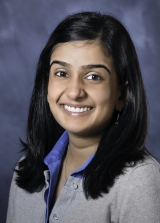 Rashmee Shah, MD, MS an assistant professor in the Division of Cardiovascular Medicine at University of Utah Health was recently awarded the Doris Duke Charitable Foundation (DDCF) Clinical Scientist Development award. As the University of Utah press release noted, Dr. Shah was, “among 17 physician-scientists in the country who have been awarded a three-year $495,000 Clinical Scientist Development Award from the Doris Duke Charitable Foundation (DDCF).”
Rashmee Shah, MD, MS an assistant professor in the Division of Cardiovascular Medicine at University of Utah Health was recently awarded the Doris Duke Charitable Foundation (DDCF) Clinical Scientist Development award. As the University of Utah press release noted, Dr. Shah was, “among 17 physician-scientists in the country who have been awarded a three-year $495,000 Clinical Scientist Development Award from the Doris Duke Charitable Foundation (DDCF).”
The press release continued to quote Dr. Shah in saying of her project dealing with the development of AI to work on atrial fibrillation (AF), “This project will be the first of its kinds to apply dynamic time warping and artificial intelligence technology to understand the role of blood pressure and AF outcomes in the context of a patient’s medical history. My project predicts that incorporating blood pressure fingerprints, together with other clinical variables, into an artificial intelligence network will precisely forecast if an AF patient will have a poor outcome compared to single blood pressure measurements.”
It may seem exceptional for a cardiologist to plunge into an AI-oriented area of research. Yet in speaking with Dr. Shah, she indicated that while her education and career development led her to cardiology, she had an interest in computer science from a young age, embedding a natural passion for this project.
As Dr. Shah speaks about her DDCF project, it is clear that this project embodies the convergence of both her expertise and the support that emerges from teams and institutional help that exist at the University of Utah.
Dr. Shah’s expertise as a cardiologist and bedside manner is almost implicit. She easily describes in understandable terms the basis for her project, defining what atrial fibrillation is—an irregular heart rate that puts people at risk of other serious complications—to establishing how complex treatment recommendations can be with AF.
What is so impressive about Dr. Shah’s project is her attention to our existence in an age of data wealth. And while data is valuable in developing an understanding of disease and treatment recommendations, it is obvious in conversing with Dr. Shah that she understands that data is not sufficient in and of itself. This is evidenced in a recent article she wrote titled, “We Don’t Need More Data, We Need the Right Data.”
Dr. Shah’s project brings her expertise into focus as she endeavors to develop an AI that is not simply an expansion of blood pressure measurements beyond past norms. She even goes beyond simply acquiring data to see what story it tells. She seeks to make that data valuable as part of an AI that will have clinical application.
Despite her clear expertise, Dr. Shah notes that the refinement of her project’s scope and purpose was likely a major contributor to her ability to receive the DDCF award. She excitedly indicated that the process was made possible as a direct result of insight that came from a multiplicity of helpful persons at the University of Utah.
There are certainly conventional areas of help that can be found in crafting any grant application. But Dr. Shah noted that people such as Mark Yandell, PhD and Martin Tristani-Firouzi, MD, helped her hone her project from being a good concept to something worthy of a prestigious award.
Not only is the University of Utah proud to have a DDCF award recipient in Dr. Shah, but to be a research institution where ideas can thrive and receive the support needed to come to life.